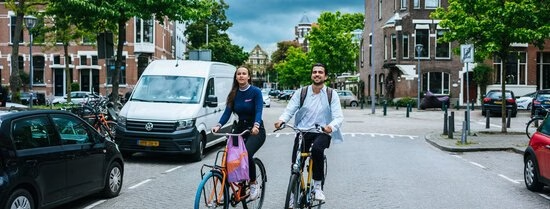Mobility is responsible for a large part of this university’s CO2 emissions. This is why Erasmus University Rotterdam works hard to make the mobility of her employees and students more sustainable. EUR encourages employees and students, by means of a sustainable mobility policy, to make conscious, informed and preferably sustainable transportation choices, such as public transport and bicycle.
An important part of CO2 emissions is caused by the travel behavior of employees and students. To address this challenge, the university recently joined the Rotterdam Climate Accord, which agrees to reduce CO2 emissions from passenger travel by at least 50 percent by 2030 compared to 2016. In 2022 and 2023, we revised the sustainable mobility scheme for employees, extending the public transport and bike scheme while also increasing parking fees (see details below). This updated mobility plan contributes to EUR’s sustainability ambitions aimed at reducing the university’s carbon footprint.
Furthermore, the zero-emission zone in Rotterdam is being expanded with campus Kralingse Zoom, the joint site of Erasmus University and Rotterdam University of Applied Sciences. This expansion is the result of the collaboration between the two educational institutions and the students of the City Logistics Living Lab project. The addition of the campus to the zero-emission zone is an important step, especially now that Rotterdam is preparing for the implementation of the zone in 2025, in which all new vans and trucks in the city must be emission-free.

Commuting
EUR would like to make its employees and students aware of the consequences each choice of transportation: that cycling and walking are not only good for their health but also for the environment; that public transport is a sustainable means of transportation and often presents a good alternative to taking the car. Taking the car to EUR is of course an option, but this leads to costs - which users will (largely) have to pay themselves.
On our employee portal, every employee of EUR must indicate which mode of transportation they use to travel to EUR and with which mode of transportation they undertake a business trip.
Electric vehicle charging points in the bicycle shed for e-bike or e-scooter.
Bicycle repair shop: there is a bicycle repair shop on campus where students and employees can go for repairs and maintenance or purchase an (e-)bike.
There are several stands on campus for electric shared scooters.
There are three public bike pumps available on Woudestein campus.
In 2023, EUR's bicycle scheme was also expanded. The bicycle scheme means that if employees buy a bicycle, e-bike or electric scooter that they use for (part of) their commute, EUR will reimburse half of the purchase price up to a set maximum. In the past, this scheme only applied to employees that had been employed for more than a year, but now all employees can claim reimbursement immediately after the probationary period.
The campus is easily accessible by metro, tram or bus.
EUR employees who travel to work by public transport get several benefits. There is no longer an upper limit of amount to be received per employee via the public transport scheme.
On weekdays, employees can also use their NS Business Card for business trips with the OV bicycle, and to park their own bike at the station free of charge.
There is a public transport card charging point on campus, to make it more convenient for employees and students to manage their public transport cards (tickets and subscriptions).
To discourage commuting by car, the tax-free kilometre allowance has not been increased from €0.19 to €0.23. This decision was made in collaboration with the Executive Board (CvB) and the Erasmus Labour Council (ELC).
Employees who commute by car can receive tax-free kilometre allowance only up to 30 kms of travel (one way).
From 1 January 2024, the parking day rate for employees increased by 50 cents. The free parking days for employees no longer exist.
To encourage the use of electric vehicles, 22 electric charging points for electric cars in our Plaza Parking.
Business travel
Of all types of transport, business travel by plane, next to commuting, has the largest percentage of CO2 emissions in the EUR's footprint.
When it comes to international travel, the policy since 2023 has been to choose transportation by train up to 700 km distance or 8 hours of travel time from Rotterdam Central Station.
If the destination is further than 700 km or the journey takes longer than 8 hours, they have the ability to choose, but travelling by train is always preferred.
If one opts for travelling by plane, then we prefer to choose direct flights where possible, unless the price difference is too large (1.5 x ticket price) and compensation of CO2 emissions is strongly encouraged.
As of the start of 2025, we have implemented a mandatory travel agent for all foreign business trips of EUR. Diversity Travel, which provides an online tool and full-service team to help our employees book trips, offers sustainable travel options within the conditions set by the EUR travel policy for foreign business trips, such as travelling by train instead of by plane for business trips under 700 kilometers. During the booking, our employees also have direct insight into the CO₂ emissions of the travel option.
